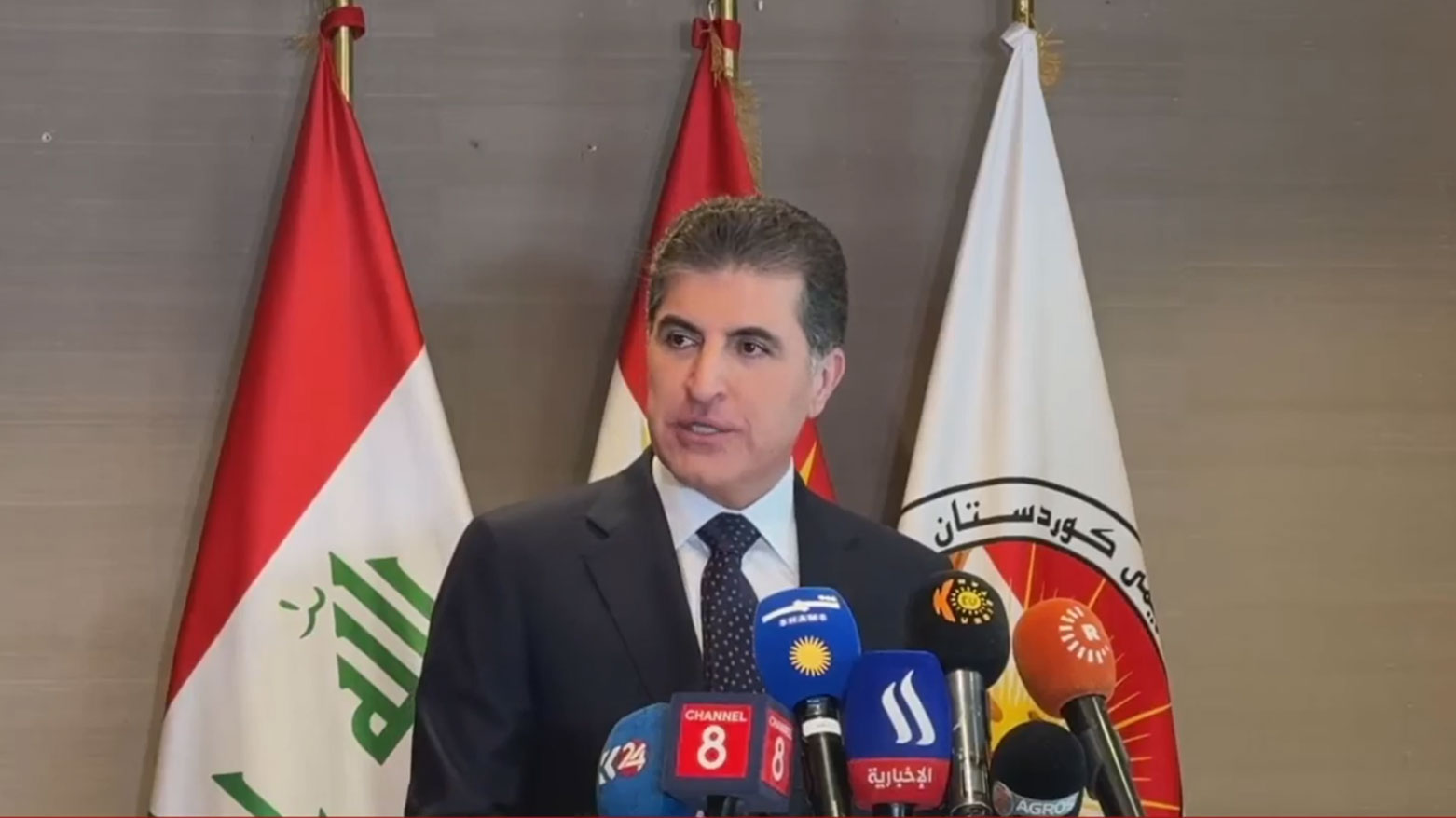KRP Nechirvan Barzani Discusses Regional, Global Affairs Following MSC2025
He discussed the ongoing negotiations to form the KRG tenth cabinet, the visit of the Imrali delegation to Erbil, and Kurdistan's diplomatic engagements with international stakeholders.

ERBIL (Kurdistan24) – Kurdistan Region President Nechirvan Barzani addressed key regional and global issues in a press conference on Sunday following his participation in the Munich Security Conference (MSC).
He discussed the ongoing negotiations to form the tenth cabinet of the Kurdistan Regional Government (KRG), the visit of the Imrali delegation to Erbil, and Kurdistan's diplomatic engagements with international stakeholders.
Kurdistan Region’s Role in Global Security Discussions
Reflecting on his participation in the MSC, President Barzani emphasized the significance of the annual conference as a platform for discussing pressing international security concerns.
“We annually participate in the Munich Security Conference. This is an opportunity for us, as the Kurdistan Region, to engage in serious discussions about global and regional developments, as well as matters related to Iraq and the Kurdistan Region,” he stated. “The conference allows us to convey our stance directly to world leaders and engage in critical conversations without the constraints of formal protocols.”
Barzani highlighted a series of high-level meetings with global leaders, during which discussions focused on regional security and stability. He reiterated the Kurdistan Region’s commitment to peace and collaboration, underscoring the importance of international partnerships.
Formation of the 10th KRG Cabinet
On the formation of the KRG’s 10th cabinet, President Barzani confirmed ongoing discussions between the Kurdistan Democratic Party (KDP) and the Patriotic Union of Kurdistan (PUK), as well as other political entities.
“There have been multiple rounds of talks between the KDP and PUK. We are focused on defining the essence of partnership in governance. We are hopeful that these discussions will soon yield a final agreement, allowing us to move forward with government formation,” Barzani stated.
The negotiations aim to establish a broad-based government that includes various political factions willing to contribute to governance in the Kurdistan Region.
Imrali Delegation’s Visit to Erbil
Addressing the visit of the Imrali delegation, President Barzani confirmed that they had met with President Masoud Barzani and were scheduled to meet with him the following day.
“The delegation is here to convey a message from Mr. Abdullah Ocalan. We hope this message will focus on achieving peace and stability in Turkey and the broader region. We also hope the PKK will heed this call and take steps toward peace,” he remarked.
U.S.-Kurdistan Relations and Coalition Forces in Iraq
President Barzani provided insights into his meeting with newly appointed U.S. Secretary of State Marco Rubio.
“We had a very productive discussion. As he is new to his role, we provided him with an overview of shared priorities between the U.S. and Iraq. We reiterated Iraq’s commitment to regional stability and extended an invitation to Secretary Rubio to visit Iraq and participate in the opening ceremony for the new U.S. Consulate in Erbil.”
On the presence of coalition forces in Iraq, Barzani reaffirmed that Iraq still requires their assistance in countering security threats such as ISIS.
“Iraq is not yet in a position to handle all security challenges alone. We have expressed our view that the coalition forces should continue their mission until stability is fully secured.”
Developments in Syria and Kurdish Participation
Discussing Syria, President Barzani noted the positive developments following the change in leadership and expressed hope for an inclusive government.
“The Syrian people have endured immense suffering. It is crucial that the new authorities in Damascus adopt an inclusive approach, ensuring that all ethnic and political groups are represented,” he said.
Barzani emphasized that the Kurdish factions in Syria must present a unified front when engaging with Damascus, citing Iraq’s post-2003 experience as a successful model.
“We advised our Kurdish brothers in Syria to claim their rightful place in shaping Syria’s future rather than waiting for an invitation,” he stated, reaffirming Kurdistan’s willingness to support stability efforts in Syria.
Peace Process with Turkey
In discussions with Turkish Foreign Minister Hakan Fidan, President Barzani addressed the ongoing peace process.
“Turkey is serious about the peace process. The key issue now is for the PKK leadership to welcome Abdullah Ocalan’s message and commit to a peaceful resolution,” he noted.
U.S. Foreign Policy and Kurdistan’s Expectations
Commenting on the new U.S. administration under President Donald Trump, Barzani noted a shift in approach, emphasizing peace and de-escalation.
“President Trump’s emphasis on ending regional wars and promoting peace is a positive message. How this is implemented remains to be seen, but the commitment to peace should be welcomed.”
Peshmerga Reform and Coalition Support
On the ongoing Peshmerga reform efforts, Barzani reaffirmed the commitment of the international coalition, including the U.S., Britain, Italy, Germany, Belgium, and Poland, in supporting the unification and professionalization of Kurdish forces.
“The reform process is progressing steadily, and all coalition members remain dedicated to assisting in unifying the Peshmerga under one ministry,” he stated.
Erbil-Baghdad Relations
Barzani acknowledged the improvement in Erbil-Baghdad relations under the current Iraqi leadership.
“Today, we are working as one team rather than two opposing sides. Prime Minister Mohammed Shia al-Sudani is taking serious steps to resolve outstanding issues, and we are committed to strengthening cooperation,” he concluded.
President Barzani’s remarks underscored the Kurdistan Region’s ongoing efforts to foster stability, maintain strong international partnerships, and navigate regional political challenges with a focus on peace and collaboration.